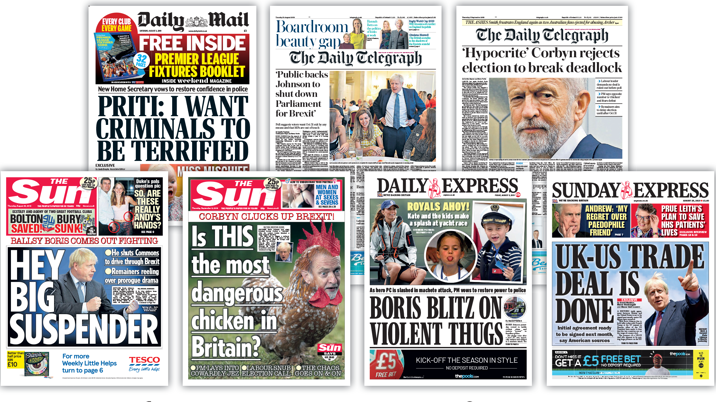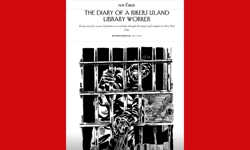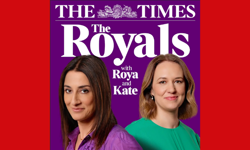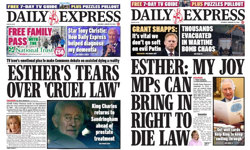
It was a far cry from Tony in open-neck shirt in Tuscany, Dave in polo shirt in Ibiza, Theresa in walking gear in Wales.
This year, the summer holiday pictures were of Boris in suit and tie in Boston, Birmingham, Belfast, Biarritz and Berlin, though not – with just 100 days to sort Brexit – Brussels.
Our new prime minister ventured on to the continent for the G7 summit and to meet Macron and Merkel, but most of the summer was spent throwing money around like a pools winner on a round-Britain whizz.
It must have come as a blessed relief for the people he met to hear about investment in hospitals, schools and police officers rather than dreary talk about the backstop. It certainly was for newspapers, which – apart from the Daily Star and its psycho seagulls – have forgotten what a silly season is.
Sadly, many also seem to have forgotten their role in “speaking truth to power” and “calling authority to account” – the big arguments put forward whenever anyone suggests looking too closely at their practices and output.
With no one in Westminster to challenge him, the press could and should have been rigorous in its reporting of Mr Johnson’s assertions and promises. Such was the delight, however, in a lively new leader, that critical faculties seemed to vanish and every stunt was fallen for. Look! Here he is with his rescue dog! Look! There he is kissing Barbara Windsor!
Never mind that the prime minister, who seemed to be everywhere, resolutely avoided answering journalists’ questions – the one press conference to which he submitted himself was populated by primary school children. A rare note of scepticism did creep in with the “People’s PMQs” on Facebook, ostensibly because of the planted questions, but really because he was using the loathed social media rival to circumvent traditional channels.
Where was all this money coming from? Almost nobody asked.
Splash the cash
The timing of the inevitable general election might have been thrown into confusion by back-to-school shenanigans in the Commons, but there was no doubt about the timing of the election campaign. It began on Mr Johnson’s very first weekend in No 10 with promises of turbo-charged Brexit planning, more money for border forces and an extra 20,000 police. From then on, the promises came thick and fast: thousands more prison places, cash to revitalise high streets, an instant end to free movement on October 31 but special fast-track visas for boffins (those ideas didn’t turn out so well). And then there were the real biggies: £1.8bn extra for the NHS, including £850m to upgrade 20 hospitals, £3.5bn for schools – which soon ballooned to £14bn.
Where was all this money coming from? Almost nobody asked. Was that £1.8bn really new money? The government insisted it was, others said it was money hospital trusts already had, but had been forbidden to spend. Did that make it new? Who knew?
Where exactly was all that money going? Another mostly unposed, unanswered question.
The hospitals announcement was made on a visit to Boston, the Lincolnshire capital of Brexit, and it turned out that all 20 beneficiaries of that £850m fund were in Leave-supporting constituencies. None of the Brexit-supporting papers mentioned that.
Similarly, the schools money was to be spent overwhelmingly in Conservative-held constituencies, with very little going to the North or deprived areas of London; 93 per cent of the schools that would receive more than £100 per pupil were in areas with a Tory MP. We learnt this thanks to an analysis by The Sunday Times, further reported in The Guardian, but the distribution of these goodies did not interest the Sun, Mail or Express.
A fund to help struggling high streets was increased to £1bn and the shortlist of towns competing for a handout doubled to 100. What were the criteria – beyond being in Tory and / or Leave areas? It would actually make sense if the candidate towns had voted Leave in the referendum, since being “left behind” has been seen as a driving force of the Brexit vote. That could have been presented as an attempt to deal with the root causes of dissatisfaction. It wasn’t. Just more “good news” from good old Boris and his team.
Nobody blinked when the Telegraph splashed on plans to spend £100m on Brexit advertising. Papers reported that it was the biggest such campaign since the Second World War, but there was no suggestion there was anything untoward about this – as there had been when David Cameron spent £9m on his pre-referendum leaflet. The “Get Ready” billboards duly appeared and we were told that mugs and T-shirts had been ordered. But who was going to drink from these mugs, wear these T-shirts? Were they to be sold as “merch” from Oxford Street kiosks or distributed among staff to stiffen resolve in Whitehall? No one asked.
In his first month in office, Mr Johnson and his ministers made spending promises totalling more than £30bn. It was like returning to the heady early days of the Blair government, with pre-announcements, announcements and re-announcements, not to mention double and triple counting on planned investment and expenditure. Michael Gove even set up a rapid rebuttal unit to counter negative interpretations of government statements. Those of us who were on the receiving end of Alastair Campbell’s late-night phone calls when an unwelcome first edition story dropped on his desk – as Gove himself was – will know exactly what that means.
But New Labour had just won a landslide election victory in 1997. It had set out its plans in a manifesto and had a mandate to carry it out.
Boris Johnson may also have just won by a landslide, but from a rather smaller niche electorate. He was still bound by the 2017 manifesto and had no mandate for his slew of policy and spending announcements, however wise or popular they may be.
With a majority of one (to be reduced to -45 by the time parliament was suspended after just a week back at work), he – and the media – knew full well that he couldn’t do any of the things he promised unless he won a general election.
Innumeracy was rife and context scarce.
Yes, but what about Corbyn?
Reporting an election campaign, even the most partisan papers feel obliged to mention other parties’ policies, but with no polling date set, who cared? Their man was in power, why not treat every government pledge as though it were set in stone and ignore (or deride) opposition ideas.
So, when thousands of people protested across the country about the suspension of parliament – a ruse supported by the Brexit press, we had postage-stamp pictures and headlines about “Corbyn’s rabble” or “Remoaners”. When Corbyn made big speeches, we learnt more of their content from the leader pages than the news columns – like this from the Daily Mail: “Higher taxes. Massive state spending. Nationalisation of rail, mail, water and the National Grid. Bigger, bolder unions. You get the picture.”
And here’s the Express reporting on Labour’s plans to revitalise high streets – the subject of one of the paper’s crusades: “‘Crazy’ Corbyn plan to seize empty shops”. No one in the story describes the scheme as crazy. So much for the editors’ code requiring accuracy and for reporting and comment to be easily distinguishable.
That story was unusual in that it led a spread. For the most part – right across Fleet Street – any Labour initiatives were shoe-horned into the Brexit package, while new government policies were given standalone treatment, with gung-ho headlines such as “Top class! Biggest rise for teachers in 20 years”, often with an accompanying comment piece by the relevant minister (more of that later).
Innumeracy was rife and context scarce. Grant Shapps announced that £30m would be spent on upgrading ports for Brexit. Thirty million? To be shared among all UK ports? With just eight weeks to go? It took Twitter, rather than the press, to note that it took £15m and seven months to upgrade a single roundabout in Oxford.
Sajid Javid’s NHS “spending spree” included a £210m training package to encourage nurses “to stay and pursue a lifelong career within our brilliant NHS”. In 2017, the government abolished nursing bursaries and replaced them with loans. Since then, a quarter of nursing undergraduates have quit their courses – against one in 20 for other subjects – citing lack of financial support, and applications have fallen by nearly a third. The new training fund would give nurses and midwives access to £1,000 over three years; most degree courses cost £9,000 a year. Did all these facts appear in the same story anywhere? No.
At the Express, Liz Truss was flavour of the month, taking time out from “sealing a trade deal with the US” (in just three weeks, compared with the eight years it took the EU to reach deals with Japan and Canada) to spell out her plan for ten duty-free zones that would create 150,000 jobs. These would, the Express reported, be based on an idea pioneered in the US, where there were 250 such ports, employing 420,000 people. Do such numbers tally? The British figure presumably included collateral job creation, but how and where were not explained.
Most such news stories carried a “duty” paragraph towards the end on how that particular initiative reversed – or went some way to making up for – cuts from Osborne’s austerity or the May years (these Conservative governments are now treated by the Johnson cabinet and its supporting papers with as much disdain as any previous Labour administration would be in more normal times – something to distance yourself from, even if you were party to it at the time). There was usually a quote from the beneficiary saying, “It’s welcome, but we need more” and occasionally a “not enough” comment from Labour. Deep-diving journalism it was not.
There were exceptions: Paul Johnson in the Mail on Sunday and David Smith in The Sunday Times wondered whether the investments were all they were cracked up to be and whether fiscal rules were being followed or broken.
The Guardian and Observer, The Times and Sunday Times made some attempt at scrutiny – for example both the Guardian and Observer on education – and secured some key scoops, notably on prorogation, Yellowhammer and the Rudd resignation.
This wholesale handing over of space to people they’re supposed to be monitoring is something else.
Precious op-ed space
Both Times titles allowed columnists to roam all over issues and express opinions counter to the papers’ official view as spelt out in leaders. These two also, in the main, restricted access to the op-ed pages to journalists and experts in their field. The Brexit-supporting Sunday Times ran a piece from Boris Johnson at the beginning of August and a big interview with the prime minister a month later but, perhaps surprisingly, the only other politicians given such space were those strongly opposed to the government’s approach: Tony Blair, Michael Heseltine and Rory Stewart.
Contrast this with the Telegraph papers, whose politico roll call included serving ministers Priti Patel, Michael Gove, Gavin Williamson, Amber Rudd, Sajid Javid, Jacob Rees-Mogg, Andrea Leadsom and Steve Barclay, former ministers David Davis, Liam Fox, Owen Paterson, Penny Mordant and Suella Braverman, plus regulars William Hague, Iain Duncan Smith and Nick Timothy, with contributions from Tory MEP Daniel Hannan and occasional appearances by Nigel Farage. To be fair, they did let Tory rebel Gutto Bebb and EU negotiator Michel Barnier join the party for a quick cocktail before returning to play the perfect host to more engaging guests.
In the five weeks from Johnson taking office to prorogation, our national newspapers ran 21 comment pieces by serving ministers, 16 by Conservative MPs (including four dissenters) and 9 by former Tory leaders. That’s not counting the Sunday Express feature entitled “Jacob’s weekly wisdom” in which the Commons leader is given a tinted panel to issue a soundbite. In the same time, there was one column by Jeremy Corbyn, three by former Labour leaders, one by a Labour MP and one by Diane Abbott that was about Toni Morrison and had nothing to do with politics.
Newspapers have long cherished agenda-setting interviews and op-eds from people in power which can be translated into splashes and wider publicity. But this wholesale handing over of space to people they’re supposed to be monitoring is something else, harking back to those unquestioning days when television interviewers would say: “What would you like to tell us, minister?”
In this, the Telegraph is by far the market leader. For months, it turned Boris Johnson’s Monday column into the splash, championing its boy all the way to Downing Street. Now he is there, it is ultra-loyal, to the extent that on the day the prime minister lost the no-deal vote and was denied a general election on his chosen date, the entire front page was framed as an attack on Corbyn.
A free press is absolutely entitled to decide which stories to print and which to ignore, to take a view on the big issues of the day, to pronounce on what it believes to be the best thing for the country. But it ignores counter views to its peril. We are in turbulent times. The Conservatives know they are fighting for their lives, fearing punishment from voters on both sides of the Brexit divide. Newspapers that are found to have lied or misled their readers – by commission or omission – are just as likely as the politicians to suffer retribution.
This article was first published in InPublishing magazine. If you would like to be added to the free mailing list, please register here.












